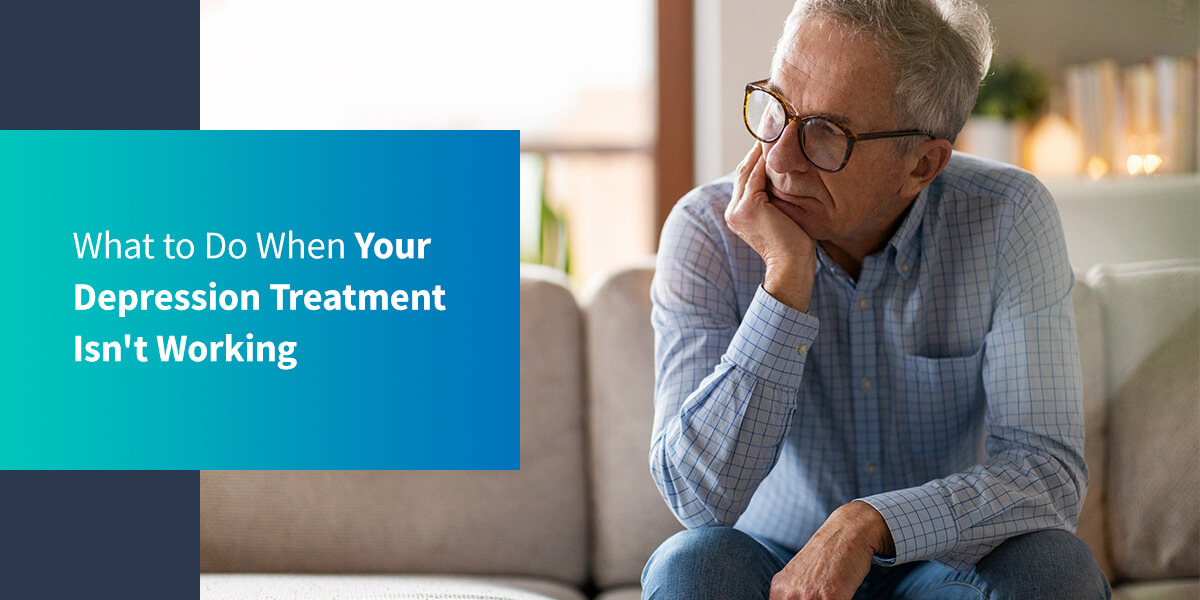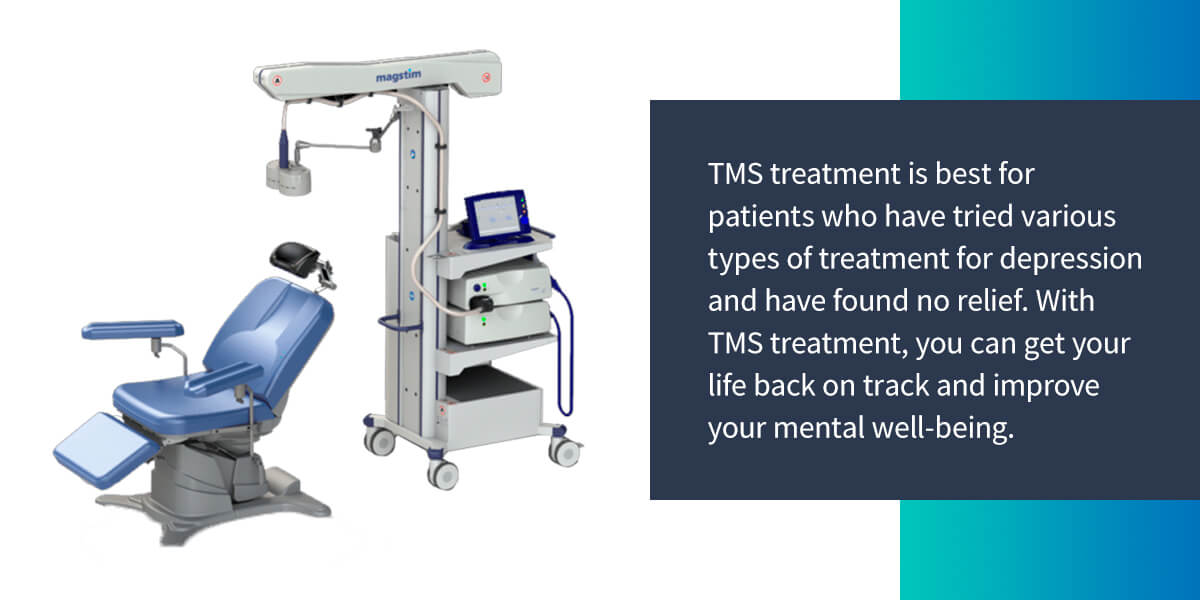
If a doctor has diagnosed you with depression, you’ve likely been placed on a treatment plan to help you find relief from your symptoms so you can improve your quality of life. Many treatment plans consist of antidepressant medication, which have helped many people with clinical depression. However, you may have been dealing with and treating depression for a while and have found no success.
The good news is that there are alternatives to antidepressants when you find that your medications aren’t improving your symptoms in the way you’d hoped. Continue reading to learn what to do when antidepressants aren’t enough to treat your clinical depression.
Antidepressant Treatment
Many doctors start treating depression with antidepressants once you talk with them about your symptoms. They’ll prescribe medication based on your symptoms and the potential side effects. They’ll ensure that the benefits of treatment outweigh the risks and prefer to try antidepressants before trying another form of treatment. Different types of antidepressants include:
- Selective serotonin reuptake inhibitors (SSRIs)
- Selective serotonin noradrenaline reuptake inhibitors (SSNRIs)
- Bupropion
- Trycyclic antidepressants (TCAs)
- Tetracyclic antidepressants (TeCAs)
- Monoamine oxidase inhibitors (MAOIs)
Doctors often start with SSRIs or SSNRIs since they’re newer antidepressants and have fewer side effects. However, other types of medications are still used to treat depression. When a doctor prescribes you a new drug, talk to them about when you can start to see results, what side effects you can expect and your options if the medications don’t help you find relief.
Signs That Your Antidepressant Isn’t Working
Antidepressants won’t start working immediately, and you’ll need to give it about four to six weeks before you start seeing real improvements. However, if you’ve taken your medications for a while and not seeing relief, you might be wondering why your antidepressants aren’t working. There are a few factors that might be causing your antidepressants to be ineffective:
- Drug or alcohol use
- New life stress
- Pregnancy
- Additional medications
Sometimes, there’s no real reason why antidepressants don’t work for some people. For people with treatment-resistant depression, this is usually the case. If you’ve been taking antidepressants for a while but are still experiencing breakthrough depression symptoms, you may need to talk to your doctor about a different treatment option. Symptoms of breakthrough depression include:
- Loss of interest in activities or socializing
- Withdrawing from friends and family
- Low mood
- Changes in sleep or appetite
Talk with your doctor if antidepressants don’t work for you. However, it’s essential to continue taking your medications until you’ve spoken with your doctor about alternatives, as there can be some uncomfortable withdrawal symptoms from quitting antidepressants cold turkey.

Antidepressant Alternatives
If you have treatment-resistant depression and have tried antidepressants in the past, there are alternatives you can use to find relief. Transcranial magnetic stimulation (TMS) is a non-invasive, FDA-approved treatment for people with major depressive disorder. TMS treatment is safe and effective and stimulates the nerve cells in the brain. When these nerve cells are stimulated, they allow neurons to fire and restore natural brain function, improving depression symptoms.
When you work with a professional and certified psychiatrist for TMS treatment, they’ll use a specialized device with magnetic coils placed on the head. The magnetic pulses target the prefrontal cortex and the surrounding areas, which are the parts of the brain affected by depression. During treatment, you may hear a quiet clicking sound or feel a gentle tapping sensation. Since the procedure is non-invasive, you’ll be able to relax the entire time. You can even talk to your psychiatrist performing the procedure, read a book or watch something on TV.
You’ll participate in TMS treatment five days a week for around four to six weeks. Individual sessions can last between three to 20 minutes, and you’ll have no required downtime after treatment. You can continue to follow your regular schedule each time you complete a session with no limitations.
TMS treatment is best for patients who have tried various types of treatment for depression and have found no relief. With TMS treatment, you can get your life back on track and improve your mental well-being.
How to Manage Treatment-Resistant Depression
While TMS treatment can help you find relief from your depression symptoms, it’s essential to manage treatment-resistant depression through your lifestyle choices. There are many ways that you can take care of yourself as you undergo depression treatment, including:
- Regular exercise: Exercise releases endorphins and can help nerve cells make new connections. Once your brain starts to function better and makes more connections, your mental health will improve, and you’ll find relief from your depression symptoms. Regular exercise can also improve your physical health, making you feel better mentally.
- Set sleep schedule: Getting enough sleep at night is essential for maintaining balanced brain chemistry. If you’re staying up late, try creating a schedule so you sleep for at least eight hours each night. If you’re struggling to get to sleep, talk with your doctor about your options so you can improve your mental health and find relief from depression.
- Consistent personal hygiene: When you’re depressed, you might neglect self-care, such as showering or brushing your teeth. When you’re unable to keep up with personal hygiene, it can make you feel worse. Try setting a schedule to take time to care for yourself to improve your self-esteem, which will help you feel better as you seek alternative treatment methods for depression.
- Socializing: Losing interest in socializing and activities is one of the many symptoms of depression, and withdrawing from friends and family can make you feel worse. Try to make an effort to spend time with your loved ones, even if it’s just hanging out around the house. You can talk with someone your trust about your challenges or they can help you distract yourself and improve your mood while you’re seeking treatment.
While it may be challenging to appreciate these changes at first, you’ll start to find these activities enjoyable again the more you do them. When you combine lifestyle changes with alternative treatment, you can find sooner relief from your depression symptoms. It may take some time before you feel back to normal, but that’s a part of the process as you learn how to manage your treatment-resistant depression.
Find Relief From Treatment-Resistant Depression With My TMS Therapy
If you’re struggling with treatment-resistant depression and have tried everything you can think of, My TMS Therapy is here to help with our TMS services. Through TMS therapy, you can find relief from your symptoms and get your life back on track. You’ll start by meeting with one of our certified psychiatrists to discuss your symptoms and potential treatment options. If you’re a good candidate for TMS therapy, we’ll create a plan for your treatment.
We can schedule an appointment with you within 48 hours to get you the help you need as soon as possible. We also provide transportation for patients within the range of our clinic. If you’re ready to find relief, contact us today to learn more about our TMS services and book an appointment.


